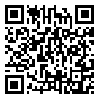Volume 81, Issue 10 (January 2024)
Tehran Univ Med J 2024, 81(10): 740-749 |
Back to browse issues page
Download citation:
BibTeX | RIS | EndNote | Medlars | ProCite | Reference Manager | RefWorks
Send citation to:



BibTeX | RIS | EndNote | Medlars | ProCite | Reference Manager | RefWorks
Send citation to:
Hajizade E, Karimi Moonaghi H, Jamali J, Mastour H. Determining the impact of stoic resilience
training on operating room staff. Tehran Univ Med J 2024; 81 (10) :740-749
URL: http://tumj.tums.ac.ir/article-1-12839-en.html
URL: http://tumj.tums.ac.ir/article-1-12839-en.html
1- Department Medical Education, School of Medicine, University of Medical Sciences, Mashhad, Iran.
2- Department of Nursing and Midwifery Care Research Center, Mashhad University of Medical Sciences, Mashhad, Iran. ,karimih@mums.ac.ir
3- Department of Epidemiology and Biostatistics, School of Health, Mashhad University of Medical Sciences, Mashhad, Iran.
4- Department Medical Education, School of Medicine, Mashhad University of Medical Sciences, Mashhad, Iran.
2- Department of Nursing and Midwifery Care Research Center, Mashhad University of Medical Sciences, Mashhad, Iran. ,
3- Department of Epidemiology and Biostatistics, School of Health, Mashhad University of Medical Sciences, Mashhad, Iran.
4- Department Medical Education, School of Medicine, Mashhad University of Medical Sciences, Mashhad, Iran.
Abstract: (678 Views)
Background: In health care, the well-being and flexibility of the operating room staff are of great importance due to the hard and stressful nature of their work. Therefore, this study was conducted to determine the effect of Stoic resilience training on the resilience of operating room staff.
| Methods: The present study was a semi-experimental pre-test-post-test intervention study with a control group. A study was conducted among 67 people operating room staff working in Imam Ali and Imam Hassan hospitals in Bojnord city in September 2023 In this research, the demographic check list and the Connor and Davidson standard resilience questionnaire were used to collect information. The educational intervention was also implemented using the “SeRenE” Stoic education package. This training package includes 4 exercises, which were used only 3 exercises per day and for 6 consecutive days (45 minutes per day) due to the resilience variable. Statistical analysis was done using SPSS version 24 and at a significance level of 0.05. Results: Based on the results, the total resilience score increased after the Stoic training (72.03±8.31) and showed a statistically significant difference with the control group (65.03±11.16) (P>0.05). The results showed that after Stoic training, mean of subscales of competence, trust in one’s instincts, tolerance of negative affect, positive acceptance of change and secure relationships, control as well as the total score of resilience increased in the training group. Although the mean score of spiritual influences dimension increased after the training, this increase was not statistically significant (P=0.097). Conclusion: The findings show that Stoic training had a positive effect on various aspects of resilience among operating room staff, whose effects are more obvious in some subscales such as trusting individual instincts, tolerance of negative emotions, and positive acceptance of change. In general, the results showed that people's resilience increased after Stoic training. It is recommended to include Stoic training programs in the training of health personnel and caregivers. |
Type of Study: Original Article |
Send email to the article author
| Rights and permissions | |
 |
This work is licensed under a Creative Commons Attribution-NonCommercial 4.0 International License. |





